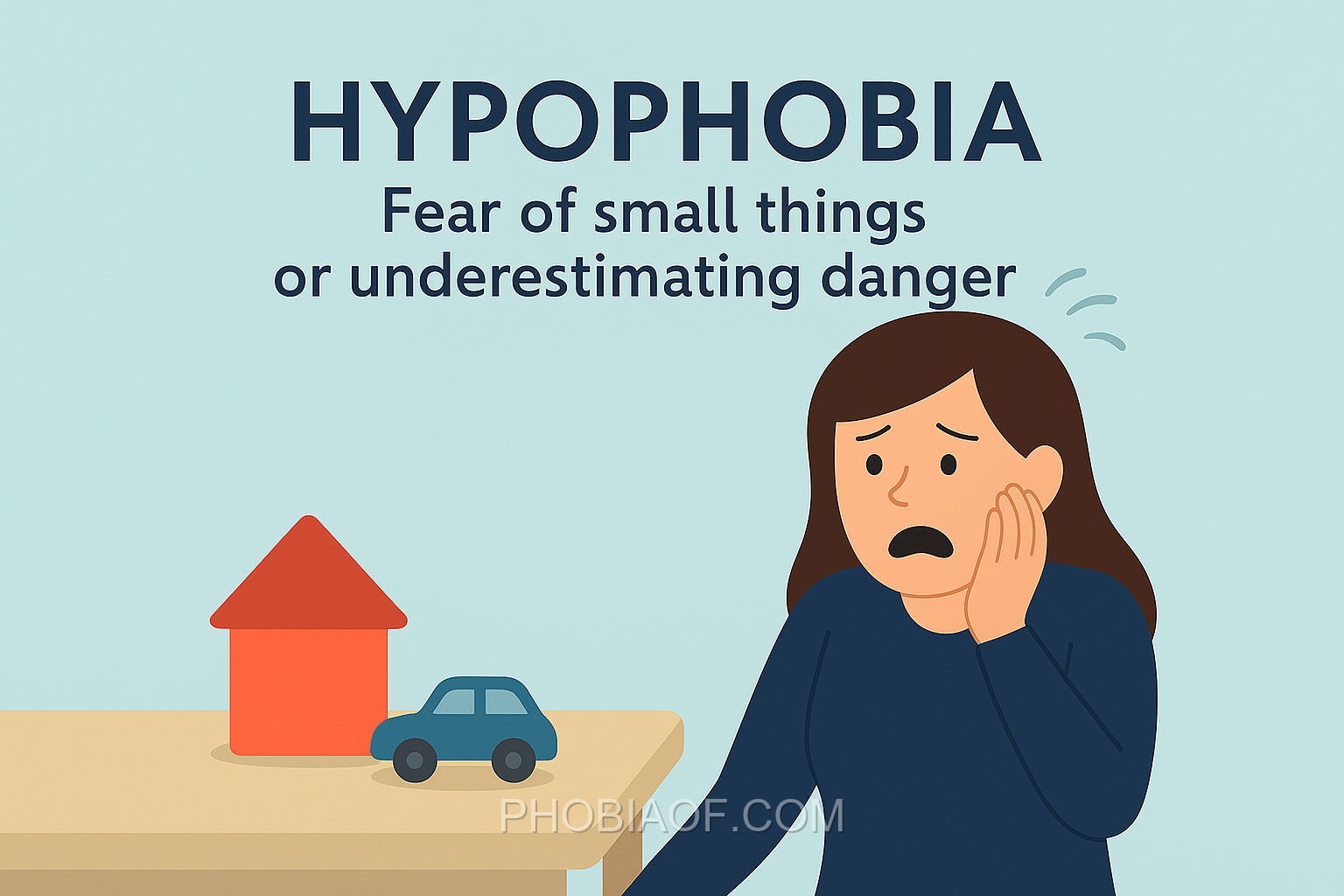Have you ever met someone who seems to breeze through life, often brushing off potential dangers or risks as if they were mere annoyances? This might be an indication of a condition known as Hypophobia.
Hypophobia, derived from the Greek words “hypo” meaning “under” or “less” and “phobos” meaning “fear,” refers to an unusual lack of fear towards small things or an underestimation of danger. Unlike the more commonly known phobias that involve an excessive fear of specific objects or situations, hypophobia is characterized by a diminished sense of fear, which might sound advantageous but can actually lead to risky behaviors and decisions.
People affected by hypophobia might often overlook potential threats, dismiss warning signs, or engage in activities without fully considering the associated risks. This can sometimes result in accidents or situations that could have been avoided with a more balanced perspective on danger. In everyday life, this could mean not wearing a seatbelt, ignoring health warnings, or taking unnecessary risks in situations that require caution.
Understanding hypophobia is important because it highlights how our perception of fear—or lack thereof—can significantly impact our lives. By recognizing this condition, we can learn to balance our sense of fear and caution, allowing us to navigate life more safely and mindfully.
Causes of Hypophobia
Hypophobia, also known as the fear of water, can develop from a variety of causes. Understanding these causes can provide insight into why this phobia affects some individuals. Below are some common reasons that may lead to the development of hypophobia.
- Genetic Predisposition:
Some people may have a genetic tendency to develop anxiety disorders, including specific phobias like hypophobia. If there’s a history of phobias or anxiety disorders in a family, it might increase the likelihood of an individual developing similar fears.
- Traumatic Experiences:
A traumatic event involving water, such as a near-drowning incident, can lead to a lasting fear of water. The intense emotions during such experiences can anchor the fear deeply, making it persist over time.
- Learned Behavior:
Observing others who are fearful of water can also contribute to developing hypophobia. If a child sees a parent or sibling reacting anxiously around water, they might learn to associate water with danger and develop a similar fear.
- Psychological Factors:
Other psychological elements, such as anxiety disorders or a general tendency toward fearfulness, can play a role in the development of hypophobia. Individuals who are generally anxious may be more susceptible to developing specific phobias.
- Environmental Factors:
The environment can also influence the development of hypophobia. For instance, living in an area prone to water-related disasters, such as floods, can heighten the fear of water due to the perceived threat.
While these factors can individually or collectively contribute to hypophobia, it is important to note that each person’s experience is unique. Research continues to explore the origins of specific phobias, seeking to understand the complex interplay between genetic, psychological, and environmental elements. Understanding these can assist in developing effective treatments and support for those affected.
Symptoms of Hypophobia
Hypophobia, an intense and irrational fear of certain situations, objects, or places, can manifest through a variety of symptoms. People with this phobia often experience overwhelming fear and anxiety. Recognizing these symptoms can be the first step toward understanding and managing the condition. Below are some common signs to be aware of:
- Panic attacks: Sudden and intense fear that peaks within minutes, often accompanied by physical symptoms.
- Increased heart rate: A rapid heartbeat often occurs as the body responds to fear.
- Sweating: Excessive perspiration is common when someone is feeling anxious or fearful.
- Trembling or shaking: Physical quivering as a reaction to intense fear.
- Shortness of breath: Feeling as though you cannot breathe properly, which can exacerbate panic.
- Dizziness or lightheadedness: A sensation of spinning or losing balance, often linked with anxiety.
- Avoidance of triggers: Deliberately steering clear of situations or objects that could provoke fear.
- Overwhelming dread: An intense feeling of impending doom or disaster related to the phobic trigger.
- Feeling detached from reality: A sense of unreality or being outside one’s own body during episodes of intense fear.
- Nausea or abdominal distress: Upset stomach or digestive discomfort as a physical manifestation of anxiety.
These symptoms can severely interfere with daily life, making it challenging to engage in normal activities or maintain relationships if the phobia is not managed effectively.
Treatment for Fear of Small Things or Underestimating Danger (Hypophobia)
Hypophobia, the fear of small things or underestimating danger, can be effectively treated and managed over time. It’s important to know that you are not alone in this journey, and with the right approach, you can overcome your fears and lead a fulfilling life.
Proven Therapies
- Exposure Therapy: This involves gradually facing your fears in a controlled and safe environment. By slowly exposing yourself to what you fear, you can desensitize your response over time, reducing anxiety and fear.
- Cognitive-Behavioral Therapy (CBT): CBT helps in changing the fearful thoughts that contribute to your phobia. By re-framing these thoughts, you can alter your emotional responses and behaviors.
- Counseling: Talking to a counselor can provide a supportive space to explore and understand your fears. They can guide you through strategies that help manage and reduce phobia symptoms.
Self-Help Coping Techniques
Alongside professional therapy, certain self-help strategies can be beneficial:
- Relaxation Exercises: Techniques such as deep breathing, progressive muscle relaxation, and visualization can help calm your mind and reduce anxiety.
- Meditation: Regular meditation can improve mindfulness and help you become more aware of your thoughts and feelings without being overwhelmed by them.
- Support Groups: Connecting with others who share similar experiences can provide comfort and practical advice on managing hypophobia.
Medication
In severe cases, medication such as anti-anxiety drugs might be prescribed. However, the focus should remain on developing therapy and coping skills that empower you to manage your phobia effectively.
Remember, it’s essential to seek professional help if hypophobia is interfering with your daily life. A mental health professional can tailor treatment to your specific needs, providing you with the most effective strategies for overcoming your fears.
With dedication and the right support, you can conquer hypophobia. Take the first step by reaching out to a professional today, and know that a brighter, fear-free future is within your reach.
Conclusion
Understanding the causes and symptoms of hypophobia can be a pivotal step in addressing this unique fear of small things or the tendency to underestimate danger. By recognizing the underlying factors and acknowledging how they manifest in daily life, individuals can begin to take proactive steps toward overcoming or managing their phobia.
It is important to remember that many people successfully navigate their phobias with time, patience, and the appropriate support. Seeking professional help, such as therapy, or consulting with a doctor, can provide valuable guidance and strategies tailored to individual needs.
Take heart in knowing that overcoming hypophobia is a journey shared by many, and with the right resources and support, it is a journey you can embark on with confidence. Consider reaching out to a mental health professional or a healthcare provider to explore the options available to you. Remember, acknowledging the challenge is the first step toward a brighter, more fearless future.
Stay hopeful and informed, and know that the path to managing your phobia is one that leads to empowerment and growth.






